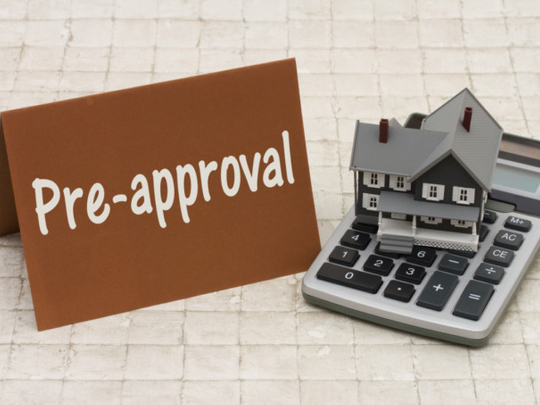
You are all excited to become a homeowner soon — your decision is made, property requirements checklist is ready, and you are set to now begin the dream home search. However, wait. If you plan to buy a home on a bank loan, experts’ recommendation is first to get finance pre-approval before any home exploration.
Every prospective buyer should first obtain a mortgage pre-approval to confirm their budget before doing any serious property hunting, says Deepak Ahuja, director of wealth management, mortgages and bancassurance at RAKBank.
“Pre-approval is an essential step to complete because the buyer has to provide a cheque for 10 per cent of the purchase price at the time of signing the sales agreement. Should the commitment occur before securing the bank’s approval and the loan application is subsequently declined, then the deposit will be forfeited.”
Ahuja adds, “As per UAE Central Bank rules, expats must pay a minimum deposit of 25 per cent of the purchase price for properties sold for less than Dh5 million. In Dubai, in addition to this down payment, you will need an additional four per cent transfer fee (less in other emirates) plus a 0.25 per cent mortgage registration fee calculated on the loan amount. New first-time buyers need to consider all these costs before finalising a mortgage.”
Product selection
A home finance is a significant commitment in anyone’s life. Tariq Abdullah Ahmad, Head of Home Finance at ADIB says that the home buyers should carefully examine financial products available on the market and select the best deal that supports their particular short- and long-term needs.
He says, “For instance, if they are only looking to live in the property for a short period, then a fixed rate for two to four years may be preferable. If the intention is to stay for a longer duration, then the buyer could consider a variable monthly payment over the expected tenure.”
With a range of profit rate programmes available in the UAE, each buyer will have different needs, objectives and time frames for which they wish to finance a property. Ahmad says, “A fixed rate structure is where the profit rate is agreed for a set time frame resulting in a consistent monthly repayment obligation. Variable rates are made of a bank’s margin over a base rate, most commonly EIBOR or an EIBOR-linked formula.” RAKBank offers Home in One, which combines mortgage loan and current account, allowing the client to offset interest based on the funds held in the account. “Customers (both salaried and self-employed) can benefit from it by using the current account for their daily requirements as well offset the interest based on the residual balance maintained,” says Ahuja.
Set provision
Since the purchase of a home is a long-term investment, Ahmad’s advice to the buyers is to aim for stability, consider, and prepare for worse case scenarios. He says, “Buyers should not stretch their ability to make repayments, and leave room for unforeseeable events which may require a substantial financial outlay.
For instance, would you be able to keep up your schedule of repayments should you lose your job? We would encourage buyers to have around one year of living costs in savings as a contingency.”
Other conditions
Ahuja says that besides the interest rate, home buyers should also consider several other charges associated with home loans. These include:
• A one-time processing fee that usually is about one per cent of the loan amount.
• Valuation fee that is charged for estimating the property value and could range between Dh2,500 and 3,000 at most banks
• Property insurance/Takaful that ranges between 0.03 to 0.06 per cent of the property value
• Life insurance/Takaful fee that starts at 0.35 per cent at most banks in the UAE. Upon the customer’s request, many banks are capable of assigning the personal life insurance policy to the mortgage.
• Early settlement fee that is one per cent of the outstanding loan amount, subject to a maximum of Dh10,000 as per the UAE Central Bank’s regulations.
• Most banks currently offer low fixed rates only for the first year. So, it is vital to check the second year rate offering and ensure that they are linked to a transparent financial term like EIBOR/LIBOR, which is readily published for verification on the UAE Central Bank’s website rather than an Interbank Rate that is not defined.
• If the customer opts for a fixed rate, he also needs to check the terms related to the breakage costs, if he chooses to exit or settle the loan during the fixed period.
• A mortgage loan is a long-term relationship, so it is essential to deal with only reputed lenders who can manage the relationship.











